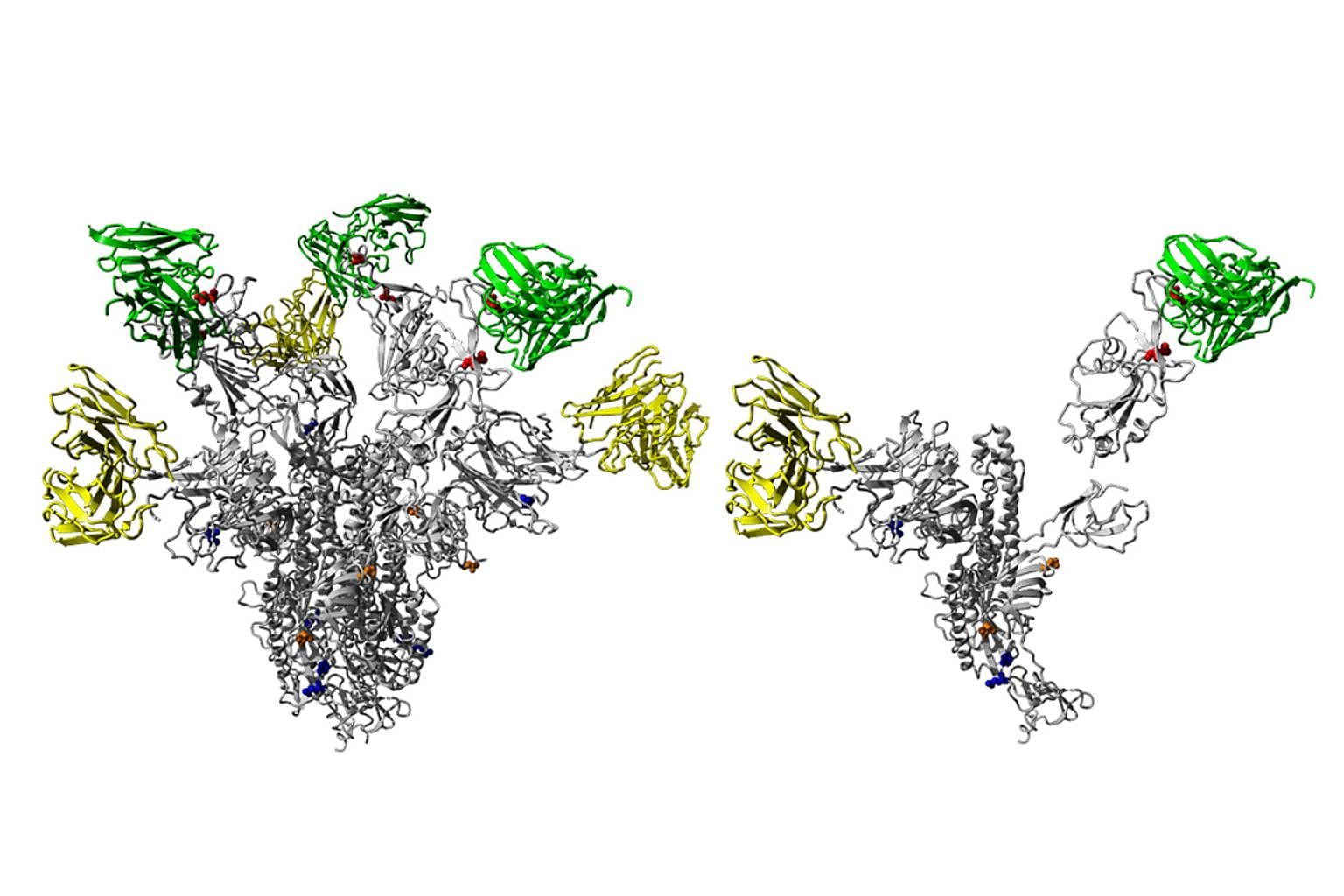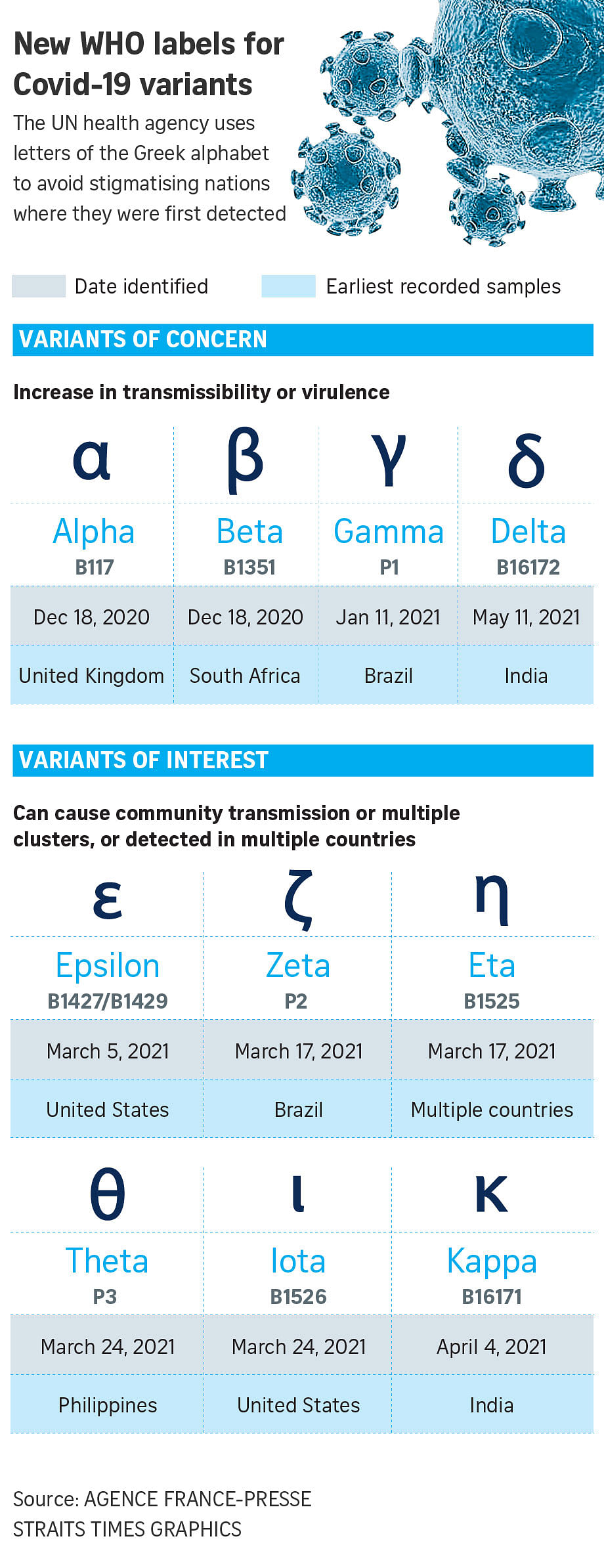COVID-19 virus variants from India detected in Singapore: What you need to know
Relatives of a person who died of COVID-19 mourn outside a field hospital in Mumbai, India, Tuesday, May 4, 2021. COVID-19 infections and deaths are mounting with alarming speed in India with no end in sight to the crisis. (Photo: AP/Rafiq Maqbool)
Bookmark
SINGAPORE: Amid a rise in community cases, the Ministry of Health (MOH) has found that nearly half of the 60 COVID-19 local cases detected here last week were infected with variants of concern or interest.
These 29 local cases have viral variants that were first detected in the United Kingdom, South Africa, Brazil or India.
On Tuesday (May 4), MOH director of medical services Kenneth Mak said that seven cases in three local clusters have one of the Indian variants - the B16172. This includes the Tan Tock Seng Hospital cluster which had 40 cases as of Tuesday.
READ: Authorities studying possibility of airflow and ventilation issues at Tan Tock Seng Hospital ward
Education Minister Lawrence Wong, who co-chairs the COVID-19 task force, said that while there were unlinked cases of COVID-19 before, these did not develop into clusters.
"The new variant strains have higher attack rates, they are more infectious, they are causing larger clusters than before," he said. "Due to the new variants, (the cases) are more infectious and larger clusters are forming."
Here's what we know so far about the new variants:
VARIANTS DETECTED IN SINGAPORE
Mr Wong noted at the task force press conference on Tuesday that the global COVID-19 situation had worsened, with new variants and cases spreading from South Asia to Southeast Asia.
MOH has listed the COVID-19 variants detected in local or imported coronavirus cases in Singapore, and six different strains were also found among local cases in the past week.
Ten local cases have one of two sub-variants from India. Seven have been infected with the B16172 variant, while three were found with the B16171 variant.
Eight local cases in the last week have the B1351 variant that was first found in South Africa.
New COVID-19 variants: Do the UK and South Africa virus strains pose a danger to Singapore?
The B117 or UK variant, which had been flagged earlier, was detected in seven cases and there were three cases of the P1 Brazilian strain of SARS-CoV-2.
LOCAL CLUSTERS WITH VARIANTS
A number of COVID-19 clusters that have formed in Singapore are tied to the coronavirus variants.
"Of note, seven cases in three of our local clusters have the B16172 or Indian variant," said Assoc Prof Mak on Tuesday.
Five of these cases are part of the cluster at Tan Tock Seng Hospital, one case is the immigration officer deployed at Changi Airport Terminal One and a case in the third cluster is a cleaner at a community care facility at Tuas South.
Professor Mak added that these viruses had been found to be "phylogenetically distinct", suggesting that the clusters were not linked.
"We have not completed the phylogenetic testing of all cases that we have and we're likely to see more viral variants identified over time," he said.
He added that the presence of these viral variants of concern affirmed Singapore's strategy to vaccinate all healthcare workers and prioritise vaccination for older Singaporeans.
"Had we not done so, the Tan Tock Seng cluster would have been significantly larger at this time," he said. "And the likelihood of that cluster getting out of control that much greater."
WHAT IS THE INDIAN VARIANT?
The COVID-19 virus is constantly mutating, but the the World Health Organization (WHO) has a "watchlist" of the variants that pose a risk to public health.
The Indian viral variant B1617 has been classified as one of seven "variants of interest" by WHO. These are variants that are being monitored as they show mutations that have epidemiological implications, such as the transmissibility or severity of the disease.
Assistant Professor October Sessions from the Saw Swee Hock School of Public Health said that as the virus spreads, the likelihood of new variants appearing increases and these will co-circulate until one gains a fitness advantage over the others.
"The majority of these variants will be neutral - they will not change the behaviour of the virus," he said.
Variants of concern, as opposed to variants of interest, must have an impact on diagnostics, treatments or vaccines, be more contagious or cause more severe disease. The UK, South African and Brazilian variants have been listed as variants of concern by WHO.
"Though this work is in progress, these criteria have not been characterised for the majority of variants that are rapidly evolving in India."
READ: India COVID-19 variant: What we know so far
Scientists are still studying whether the Indian variant is driving an unexpected explosion in cases in India. WHO said in its Apr 27 update that preliminary modelling suggests it has "a higher growth rate than other circulating variants in India, suggesting potential increased transmissibility".
"It is often hard to tease out whether increased spread is due to relaxation of societal measures, decreased compliance or the virus itself," said Professor of Medicine at NUS Yong Loo Lin School of Medicine Dale Fisher.
"I think most of us believe that all these variants of concern are more transmissible because they have quite quickly become dominant and there are shared mutations."
KEY MUTATIONS IN INDIAN VARIANT
There are three sub-strains of the B1617 variant - B16171, B16172 and B16173, and they share some characteristic mutations.
The variant has been called the "Bengal strain" as it was first detected in that region in India. It has also been called a triple mutant - although the variant contains a total of 13 spike protein mutations, there are three which are of concern.
All three mutations have been detected in other globally circulating variants and experts say they have evolved independently as the virus adapts to better infect humans.
One of the mutations, E484Q, which is very similar to the E484K mutation found in the South African and Brazilian variants, has been called the "escape mutation". This is because it appears to partially "escape" immunity from prior infection or vaccines.
Another mutation, L452R, was associated with large outbreaks in California and is estimated to be 20 per cent more transmissible than earlier waves of the virus. A third mutation, P681R, is also thought to make the virus more infectious.
Professor Fisher said that the variants have an increased capacity to bind: "It is like a lock and a key where the virus spike protein is the key and the receptors on the host cell are the lock. The mutations have a better key shape so it takes less virus to cause disease."
This means that precautions such as safe distancing, masks and hand hygiene have to be "done very well", he said.
"The measures still work but the new viruses are better at infecting so (they) will take advantage of small breaches that you may have gotten away with when the virus was the earlier strains."
Asst Prof Sessions added there have now been many documented cases of people shedding the virus beyond the 14-day mark.
"In response to this and the increased presence of more highly transmissible strains currently circulating in nearby countries, the stay-home notice has now been increased to 21 days to prevent the escape of the viruses into the community," he said.










